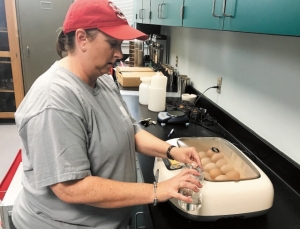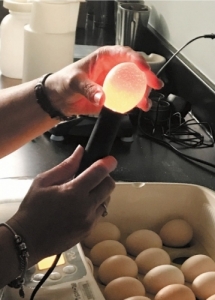Hatching a lesson plan
By Phyllis Moore
Published in News on August 14, 2017 8:53 AM

News-Argus/PHYLLIS MOORE
Jennifer Johnson, animal science instructor at Wayne Community College, adds water to an incubator of chicken eggs she hopes will hatch in time for the first day of her poultry production course when school resumes later this week.

News-Argus/PHYLLIS MOORE
Jennifer Johnson checks the progress with a digital incubator, resembling a flashlight, that lets her know how the baby chick is developing.
Jennifer Johnson loves animals.
So it's been a natural progression for her to be the animal science instructor at Wayne Community College for nearly a dozen years.
It didn't happen right away, though.
Growing up in the Patetown community, when she headed off to N.C. State University her goal was to become a veterinarian. But she decided against the additional years of school required.
She met and married fellow student Kevin Johnson, and the couple moved around before he took a job as Wayne County extension agent about 20 years ago.
"We had the opportunity to move here, which was home for me," she said. "I looked into doing lateral entry teaching, teaching biology and earth science at Southern Wayne and Aycock."
From there, she taught in the basic skills department at WCC for a few years.
A chance conversation led to her current job.
Her husband was in the Leadership Wayne County group, and someone in the group was filling in for the animal science instructor. Kevin mentioned that his wife had an animal science degree and was already at WCC.
"I love what I do," Jennifer said. "I have the animal science background. I have got the education background. It's a fit."
The program covers a variety of animal species. When she started out, it was called livestock and poultry and was waning in popularity.
"I can remember the first registration, my third day on the job and no one showed up," she said. "They told me at the college, if this program doesn't work we'll find something else for you.
"That's not my nature. So I started restructuring. We changed the name to applied animal science to make it a little more marketable."
Other classes have been added -- a small animal class, equine class and courses covering swine, poultry, cattle, sheep and goats -- to give the students a broader background.
A lot of students come into the program because they have an interest in animals, particularly horses.
"I tell them, you need to get a job. You can work to support your horse habit," she said with a smile.
The two-year program can be enough for some. Graduates can work as veterinary assistants, in a quality assurance field lab or pathology lab, or places like Goldsboro Milling in the area of swine farm manager trainees.
There are also opportunities for internships and students are required to work, paid or unpaid, for 320 hours while they are in school.
The program is small in scope, but affords Jennifer with the change to work closely with her students.
"I teach all the animal science classes," she said. "I'm their advisor and instructor for all the classes, so I get to know them.
"Probably the most exciting thing, I'm always changing my classes. I'm always looking for new ways to do things and get the point across the students."
With 14 courses offered, average class size is 12 to 14. It graduates nearly a dozen students each year.
To some she may be a mother figure, she says. It's a role she is comfortable with, says the mother of two -- son, Brian, is going to dental school, while daughter, Sabrina is heading off to N.C. State.
"The rewards are getting to know the students and seeing them become successful at the end, finding a job and finding what they really want to do and encouraging them," she said. "There's some that stumble. To see them three or four years later and they've got a job, they've got a family and they're still in the animal science field is great."
Kevin weighed in on his wife's adeptness in the job.
"I think her greatest strength is her passion. She cares," he said. "The job never ends. She's talking to (students) at night, on the weekends, whenever we go to the beach or on vacation. She's still communicating with her students.
"It's not like an 8-to-5 job for her. She ultimately just really cares about the people and the success of the program."
Jennifer says because she is the only one in the program, the "go-to person," she tries to be accessible to her students.
Likewise, she communicates often with those in the industry.
"There are more people calling me about students than I have students to fill the jobs," she said, explaining about the importance of matching the right person for the role. "There are lots of jobs and lots of job opportunities for those willing to put forth the effort."
